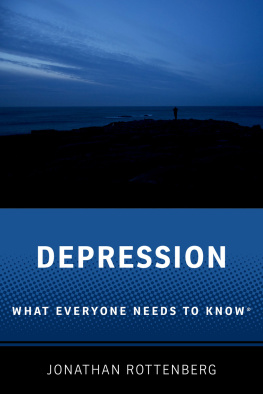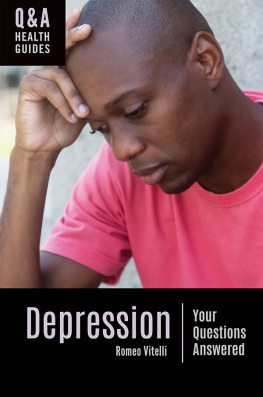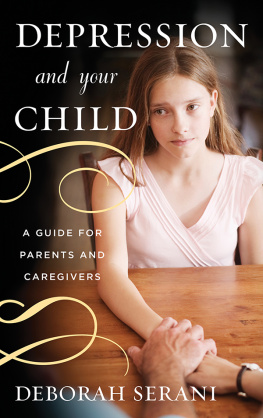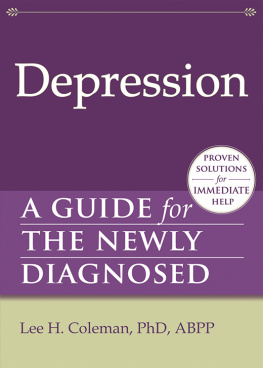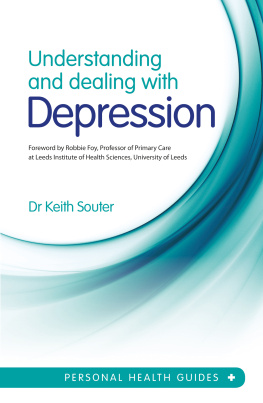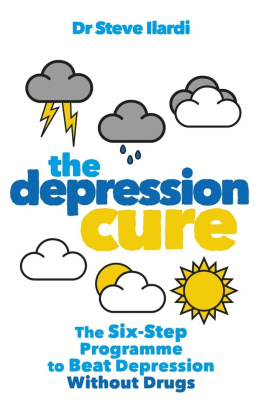Contents
Acknowledgments
The authors would like to acknowledge the assistance of Drs. Sid Kennedy and Joel Raskin, whose review of and comments on the section on medications in the first edition were very helpful. We would also like to thank Tom and Meg for their invaluable thoughtfulness and assistance in reviewing this publication from the perspective of a patient/consumer and family member.
This revised edition was reviewed by Frances Abela-Dimech, BSCN, MN, CPMHN(C), and Claudia Tindall, MSW, RSW.
Introduction
This guide is for people living with depression, their families and anyone who wants to understand the basics of this illness and its treatment and management. It is not a substitute for treatment from a doctor or mental health care provider, but it can be used as a basis for questions and discussion about depression. This handbook covers many aspects of depression and answers frequently asked questions. With respect to treating depression, new therapies and medications are continually being developed and some current medications may not have been available when this guide was published.
1 Understanding depression
Depression is such cruel punishment. There are no fevers, no rashes, no blood tests to send people scurrying with concern. Just the slow erosion of the self, as insidious as any cancer. And, like cancer, it is essentially a solitary experience. A room in hell with only your name on the door. I realize that every person, at some point, takes up residence in one or other of these rooms. But the realization offers no great comfort now .
Martha Manning, Undercurrents (1994) author/therapist who has dealt with major depression
The pain and isolation of depression, a psychiatric illness, is difficult for many people to understand. Depression is a word that is used both for a sad, despairing mood and for a psychiatric disorder. Everyone feels sad, down or blue at times, often following a disappointment, loss of a loved one or other traumatic life event. This is a normal reaction and our depressed moods usually lift fairly quickly. Sometimes, though, a depressed mood can persist and become a more significant mental health problem, commonly referred to as clinical or major depression.
What is major depression?
Depression is much worse than simple unhappiness. Major depression (also called clinical depression) is a mood disorder . This means that a persons emotional state is abnormally low or sad, and the person cannot independently raise his or her mood. The chief symptom of major depression is a sad, despairing mood that persists beyond two weeks and impairs a persons performance at work, at school or in social relationships. This profoundly low mood state can be confusing because some of the symptoms of depression are behavioural, such as moving or talking slowly, while others are emotional and cognitive, such as feeling hopeless and thinking negative thoughts. This is very different from the physical symptoms of other illnesses, like the pain of a broken leg or the fever from a serious infection.
Depression is more common in women, though the sex difference diminishes with increasing age in Canada. Depression is most common in people between the ages of 15 and 45.
HOW IS DEPRESSION DIAGNOSED?
In making a diagnosis, a doctor will ask you if you have experienced any of the following:
- changes in appetite and weight
- sleep problems, either sleeping too much or too little
- loss of interest in work, hobbies, people; loss of feeling for family members and friends
- feelings of uselessness, hopelessness, excessive guilt
- preoccupation with failure(s) or inadequacies and a loss of self-esteem; certain thoughts that are obsessional and difficult to turn off
- agitation or loss of energy; feelings of restlessness, or being too tired and weak to do anything
- slowed thinking, forgetfulness, trouble concentrating and making decisions
- decreased sexual drive
- a tendency to cry easily, or having the urge to cry but being unable to do so
- suicidal or occasionally homicidal thoughts
- in some cases, a loss of touch with reality, perhaps hearing voices (hallucinations) or having strange ideas (delusions).
Depressive disorders can vary in severity. A person who experiences fewer than five of the symptoms of major depression for two weeks or more is diagnosed with minor depression. When someone experiences five or more of these typical symptoms for at least two weeks, this is called a major depressive episode. For many people, however, their struggle with depression has persisted for weeks, months or even years before they visit a doctor or mental health care provider. It is not uncommon for people to try to cope on their own while feeling their mood slipping or dropping, until it reaches a point that feels intolerable. People struggling with depression may also find themselves to be much more sensitive to comments from others, and they get little or no relief when loved ones and friends try to cheer them up or offer support.
The length of a depressive episode is influenced by the persons ability or willingness to get treatment. A treated depressive episode may only last for two to six weeks; however, untreated episodes may last six to 18 months or longer. The average is about five months.
DEPRESSION AND BIPOLAR DISORDER
Depression also occurs in bipolar disorder (formerly known as manic-depressive illness). Bipolar disorder is a mood disorder, but is characterized by episodes of mania as well as episodes of depression. A person with mania will typically have an inflated or grandiose perception of his or her own importance or power. This can result in excessive involvement in activities that can lead to painful consequences (e.g., foolish business investments, shopping sprees, sexual indiscretions). People with mania may also have less need for sleep, a pattern of very rapid speech and racing thoughts. During a manic episode, many people are unaware that their behaviour is unusual. Before a manic episode, however, people generally experience a hypomanic phase , where they exhibit some less severe symptoms of mania (e.g., sleep disruption, a racing feeling), and are aware that they may be heading toward a full manic episode. This insight allows them to seek medical intervention and possibly avert a full-blown manic episode.
While they share similar symptoms of depression, bipolar disorder and major depression are separate disorders requiring different treatment. Because of this, it is important for patients, family members and health care providers to watch for signs of mania or hypomania in people experiencing depression. Other warning signs for the presence of bipolar disorder include:
- depression that begins in the teenage years
- certain kinds of depression ( atypical depression , seasonal depression, postpartum depression, and possibly depression with psychosis), whose symptoms may all sometimes occur as part of bipolar disorder.
Different kinds of depression
Major depression is broken down into subtypes, each with a slightly different set of symptoms. It is important to receive an accurate diagnosis, because different types of depression may respond better to different types of treatments.
DEPRESSION WITH TYPICAL OR ATYPICAL FEATURES
In addition to the general features of depression, people with typical symptoms of depression tend to experience sleep difficulties (trouble falling asleep, sleeping less than usual, and/or frequent waking through the night), decreased appetite, and weight loss.
People with atypical symptoms share the general features of major depression, but some symptoms are reversed: they tend to over sleep, eat more than normal and gain weight. In addition:




